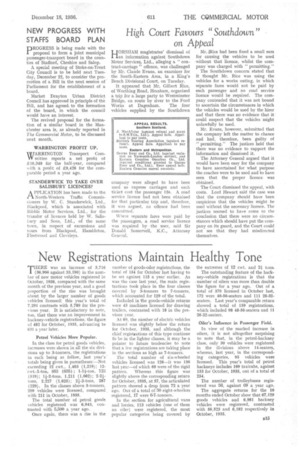High Court Favours "Southdown » on Appeal H ORSHAM magistrates' dismissal
Page 49

If you've noticed an error in this article please click here to report it so we can fix it.
of an information against Southdown Motor Services, Ltd., alleging a " contract-carriage " offence, was challenged by Mr. Claude Evans, an examiner for the South-Eastern Area, in a King's Bench Divisional Court, on Tuesday.
It appeared that Mr. Gilbert Rice, of Was-thing Road, Horsham, organized a trip for a large party to Westminster Bridge, en route by river to the Ford
Works at Dagenham. The four vehicles supplied by the Southdown
company were alleged to have been used as express carriages and each ticket cost the passenger 15s. A road service licence had not been obtained for that particular. trip and, therefore, it was argued, an offence had been committed,
Where separate fares were paid by the passengers, a road service licence was required by • the user, said Sir Donald Somerveil, K.C., Attorney General. Mr. (Rice had been fined a small sum for causing the vehicles to be used without that licence, whilst the company was charged with " permitting."
The Southdown concern stated that it thought Mr. Rice was using the vehicles for a works outing, in which
separate fares would not be paid by each passenger and no road service
licence would be required. The com pany contended that it was not bound to ascertain the circumstances in which the vehicles would be used by the hirer and that there was no evidence that it could suspect that the vehicles might unlawfully be used.
Mr. Evans, however, submitted that the company left the matter to chance and had, therefore, been guilty of " permitting." The justices held that there was no evidence to support the information and dismissed it.
The Attorney General argued that it would have been easy for the company to have ascertained for what purpose the coaches were to be used and to have seen that the proper licence was obtained.
The Court dismissed the appeal, with costs. Lord Hewart said the case was that the company should have been suspicious that the vehicles might be used without the necessary licence. The justices seemed to have come to the conclusion that there were no circumstances which should have put the com pany on its guard, and the Court could not see that they had misdirected themselves.




















































































